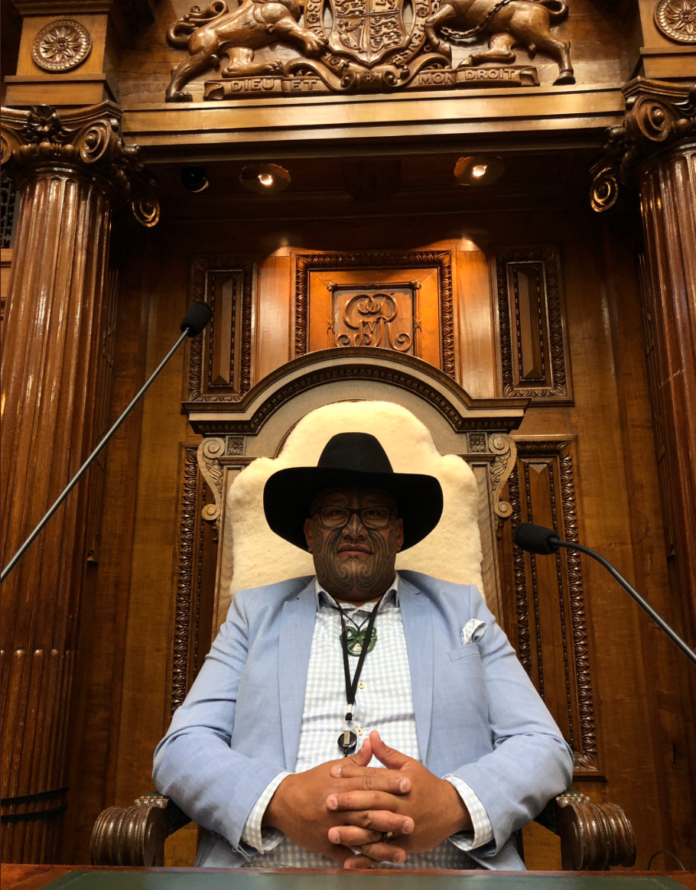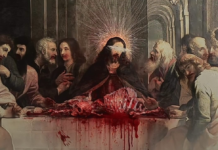Whether it be admitting new citizens into the country or parliamentarians to a new parliament, all must swear an oath to the Crown.
Who is this Crown? Where is this Crown? What is this Crown?
There is a myth that the Crown exists as some higher spirit in the governance and benevolence of this country and nation.
For example, every new parliament opens with a speech from the Crown read out by the Crown’s representative. In New Zealand that is the Governor General.
Not once, has the Queen or the Governor General ever written that speech. It is written by the elected Prime Minister of the day. Why call it a speech from the throne? Not once has the Crown used its power to not consent to Acts of Parliament on political discretion from the government.
Apart from seizing indigenous people’s assets in the name of this Crown to better the Crowns mates’, the Crown has done absolutely nothing to advance the interests of modern day New Zealanders, who are a people that have been subjugated by no one.
We are a stand-alone sovereign nation that conjures up this notion that the Crown thing somehow gives our political system some sense of authority.
The reality is this nation is a sovereign nation and is governed, not by the Crown, but by the power of a Prime Minister and the executive known as Cabinet.
Parliament in full committee endeavours to keep the Prime Minister and the executive honest and accountable.
Someone living twenty thousand kilometres away in the middle of Europe has absolutely nothing to do with the evolution of this nation. The closest I have ever come to the Queen of England was licking the back of her head on a postage stamp when the post office use to work.
When we swear allegiance to something, it must not be a myth. It must be real-time and real substance.
Swearing our allegiance to the betterment and benefit of fellow New Zealanders and the constitutional true underwrite to this nation’s founding, must surely replace this nonsense. The myth that somehow there is an all loving, all caring, all protecting Aunty living in London that sees all things, is above all things and therefore must be worshipped, has to change.
We must liberate ourselves and commit:
-
To our independence
-
To our own sovereignty
-
To the majesty of our mountains, rivers, lands and seas
-
To the authority of the people that continue to carve out our nationhood story on a daily basis
-
To our own Magna Carta – the Treaty of Waitangi – as the founding document for a vibrant and just society
It’s time to move on.
John Tamihere is Chief Executive of Urban Māori Authority Te Whānau O Waipareira and the Whānau Ora Commissioning Agency. He is a former Labour Party Cabinet Minister. For more information go here.






Couldn’t agree more, when we look at the Queen we need to remember, while she might look like a lovely dear little old lady, her power and wealth came from rape and pillage. Her royal title and the huge wealth that came with this was achieved by the sword. She is no more royal than I am and many others. In fact I am probably more royal than her due to my whakapapa lines. However many now know the part the church played by sanctioning the rape and pillaging of many peoples particularly indigenous peoples who are now the most colonised peoples in the world. And these many indigenous peoples happen to share the same negative statistics in all facets of life with many now being homeless in their own lands.
Kia ora John
The Crown is a complex structure involving the monarch (currently Queen Elizabeth) who is sovereign and the apparatus of state (Governor General, security services, armed forces, police, ministers of the Crown, government departments, and the judiciary).
The key to all this is the “monarch..who is sovereign” which raises the question of why and how she came to declare herself sovereign over these islands.
Certainly not by the Treaty of Waitangi, which only granted her great-great-grandmother Queen Victoria kawanatanga (subordinate powers of governance) and reserved rangatiratanga (sovereign authority) to the people of the land and their chosen chiefs.
In 1862 our people refused en masse to swear allegiance to Victoria as sovereign, and consequently we were subject to invasion by British and Australian regiments.
Despite the military defeat suffered then, we should hold true to the ideals of 1862: rangatiratanga, mana motuhake and kotahitanga. We should not recognise the claimed sovereignty of the British Queen or submit to the purported authority of the British Crown.
Decolonisation means complete liberation from the British Crown and the reestablishment of indigenous political institutions which provide for the freedom and dignity of our peoples: Maori, Pakeha and all others.
When the Queen pops her clogs would be a good time to stand on our own two feet and work out our own constitutional destiny. do away with QB weekend and go full on with Matariki for a start.
Kia ora ano John
I have to take issue with the idea that the Treaty of Waitangi is the founding document of our nation – regardless of what you consider “our nation” to be.
I base my argument solely upon the text in te reo Maori, as is right and proper in international law.
The treaty was a limited arrangement for a short term. It gave Victoria the responsibility of governance under the sovereignty of the those chiefs of the iwi of Aotearoa who signed the Treaty. The nature of the relationship between Victoria’s kawanatanga and the chiefs’ rangatiratanga is made clear in the following text “Na i te tekau ma rima o nga tau o te rangatiratanga o Taipiria Hiha, i a Ponotia Pirato e kawana ana i Huria…”. That is, Victoria is appointed by the chiefs and may be dismissed by them. In any event she is given no rights to pass her office to her heirs or any other person upon her death. There is no right of succession, either explicit or implicit, although the right of delegation in her lifetime may be inferred. So the Treaty ceased to have effect upon the death of Victoria in 1899. Of course by then the Treaty had already been dishonoured and nullified by the British Crowns repeated acts of violence and rebellion against the rangatiratanga, and so it may be said that the Treaty had ceased to have effect by 1862 at the latest.
Therefore it is not the founding document of our nation. If there is such a document, it would be the Whakaputanga of 1835.
For the British, the founding document of the Realm of New Zealand is actually not the Treaty, which was never honoured and has been made null and void, but Hobson’s Declaration of Sovereignty on 21 May 1840 which states “the full sovereignty of the Northern Island of New Zealand vests in Her Majesty Queen Victoria, her heirs and successors, for ever.”
That of course goes well beyond the principles of the Treaty of Waitangi, but it constitutes the basis on which the colonial regime has ruled ever since.
It was followed by a Declaration relating to the South Island which makes reference to the North Island as also being under British sovereignty but which with respect to the South Island simply makes a bald and naked assertion of sovereignty.
So whichever nation you consider to be our own – whether Te Rangatiratanga o te Whakaputanga or the colonialist Realm of New Zealand – the Treaty of Waitangi cannot be its founding document.
Correction: Victoria died in 1901, not 1899 as stated above.
Kia ora ano John
I have to take issue with the idea that the Treaty of Waitangi is the founding document of our nation – regardless of what you consider “our nation” to be.
I base my argument solely upon the text in te reo Maori, as is right and proper in international law.
The treaty was a limited arrangement for a short term. It gave Victoria the responsibility of governance under the sovereignty of the those chiefs of the iwi of Aotearoa who signed the Treaty. The nature of the relationship between Victoria’s kawanatanga and the chiefs’ rangatiratanga is made clear in the following text “Na i te tekau ma rima o nga tau o te rangatiratanga o Taipiria Hiha, i a Ponotia Pirato e kawana ana i Huria…”. That is, Victoria is appointed by the chiefs and may be dismissed by them. In any event she is given no rights to pass her office to her heirs or any other person upon her death. There is no right of succession, either explicit or implicit, although the right of delegation in her lifetime may be inferred. So the Treaty ceased to have effect upon the death of Victoria in 1899. Of course by then the Treaty had already been dishonoured and nullified by the British Crowns repeated acts of violence and rebellion against the rangatiratanga, and so it may be said that the Treaty had ceased to have effect by 1862 at the latest.
Therefore it is not the founding document of our nation. If there is such a document, it would be the Whakaputanga of 1835.
For the British, the founding document of the Realm of New Zealand is actually not the Treaty, which was never honoured and has been made null and void, but Hobson’s Declaration of Sovereignty on 21 May 1840 which states “the full sovereignty of the Northern Island of New Zealand vests in Her Majesty Queen Victoria, her heirs and successors, for ever.”
That of course goes well beyond the principles of the Treaty of Waitangi, but it constitutes the basis on which the colonial regime has ruled ever since.
It was followed by a Declaration relating to the South Island which makes reference to the North Island as also being under British sovereignty but which with respect to the South Island simply makes a bald and naked assertion of sovereignty.
So whichever nation you consider to be our own – whether Te Rangatiratanga o te Whakaputanga or the colonialist Realm of New Zealand – the Treaty of Waitangi cannot be its founding document.
Monster Lives under My Bed Animated Shorts by Avocado
Comments are closed.